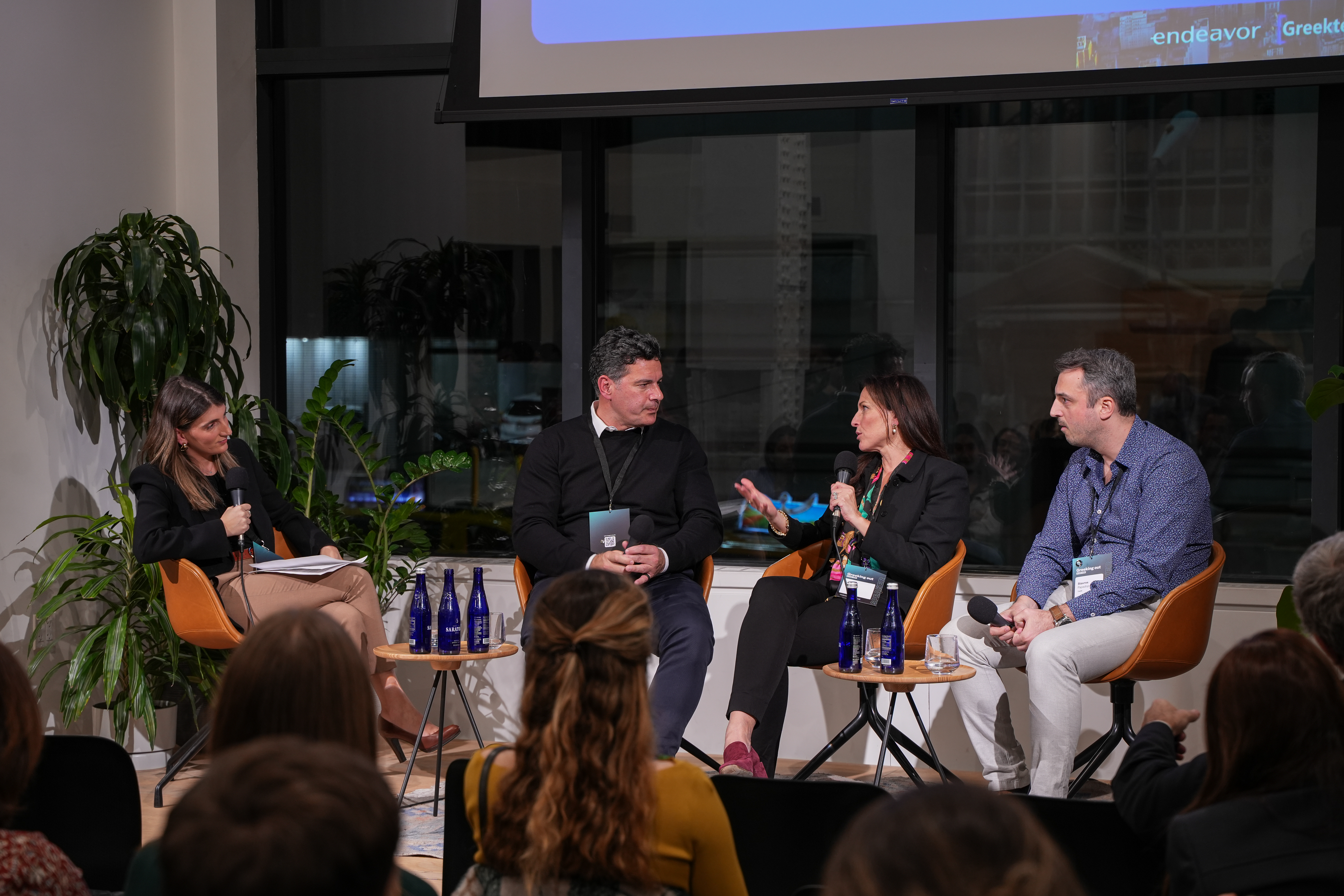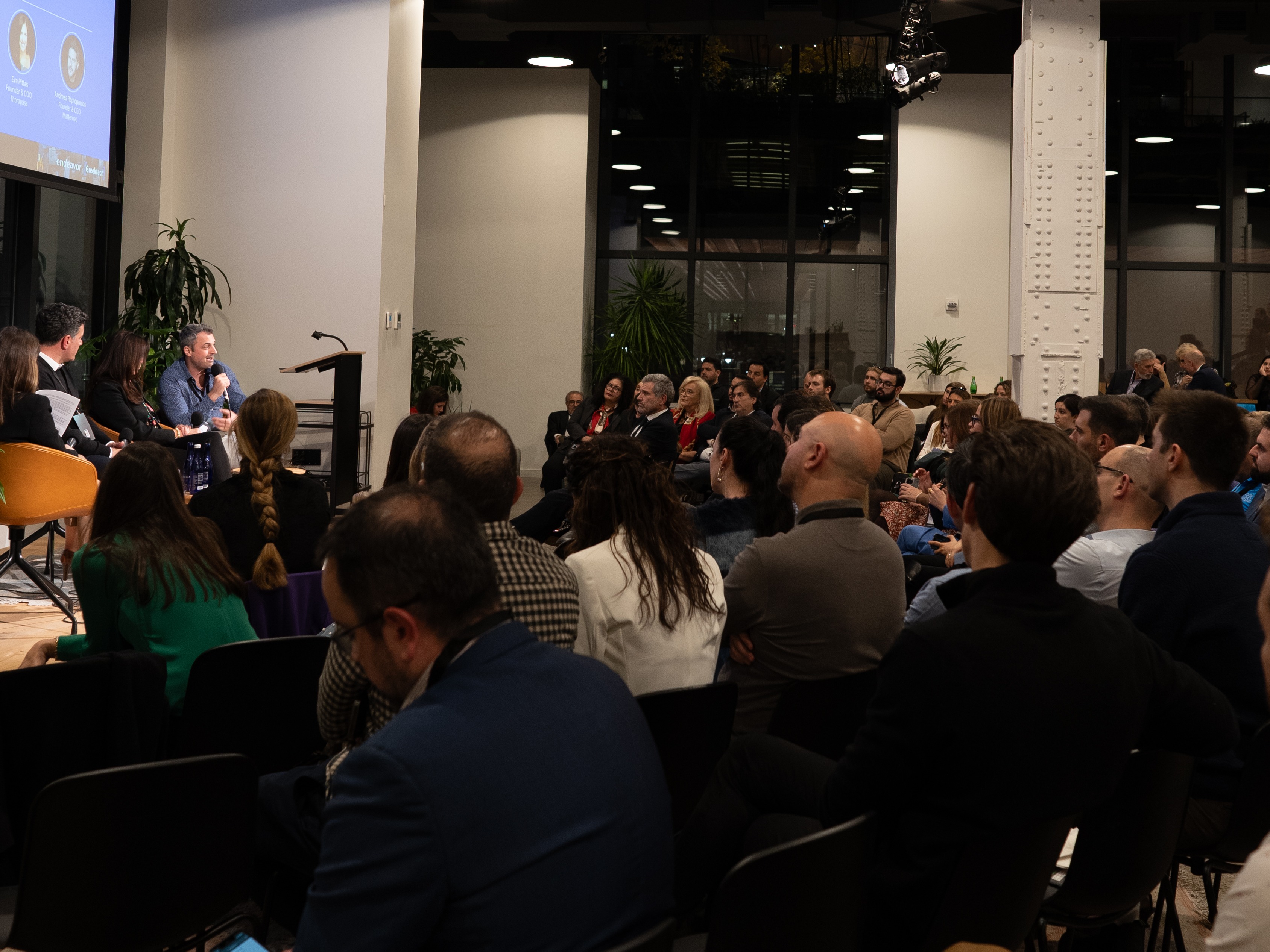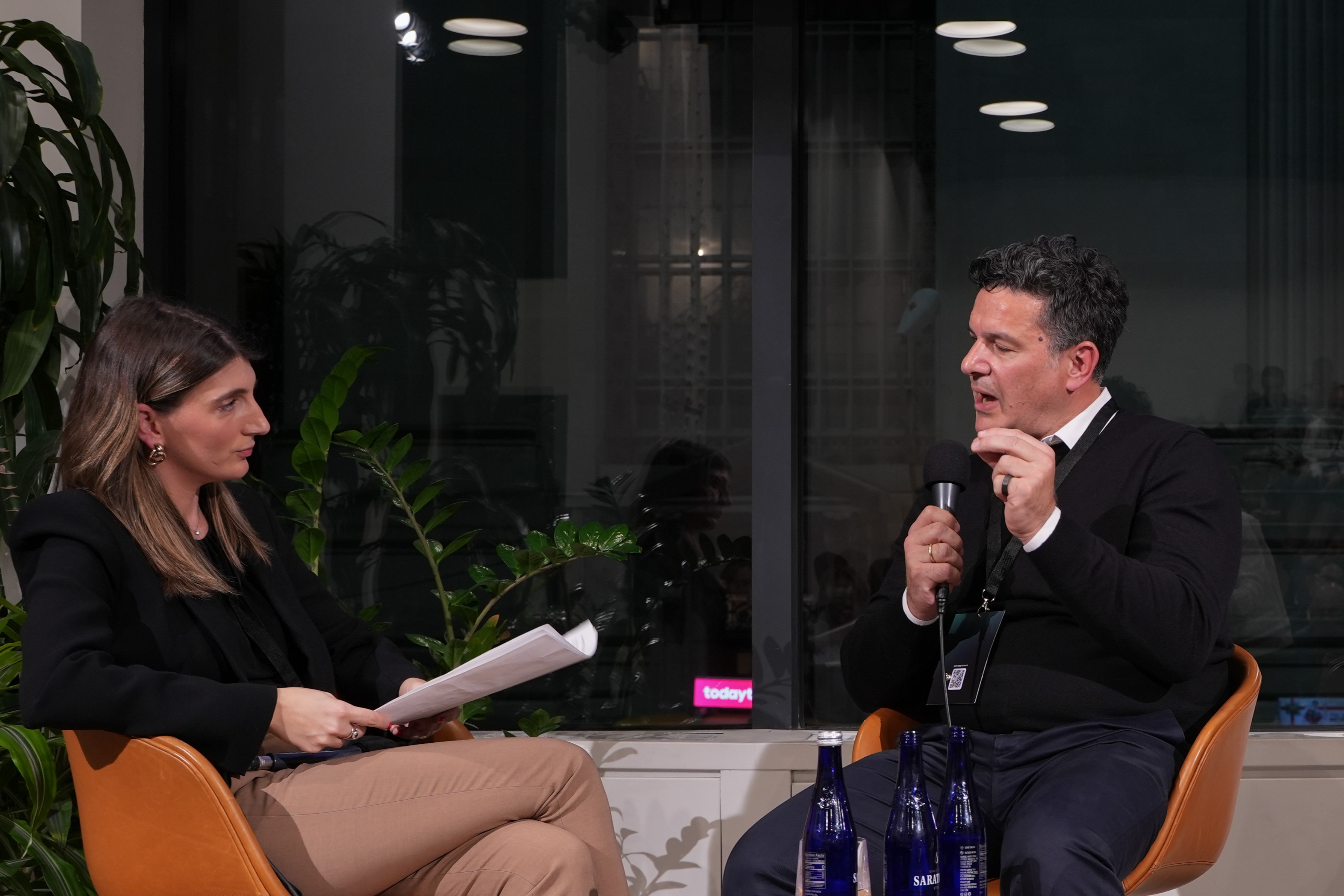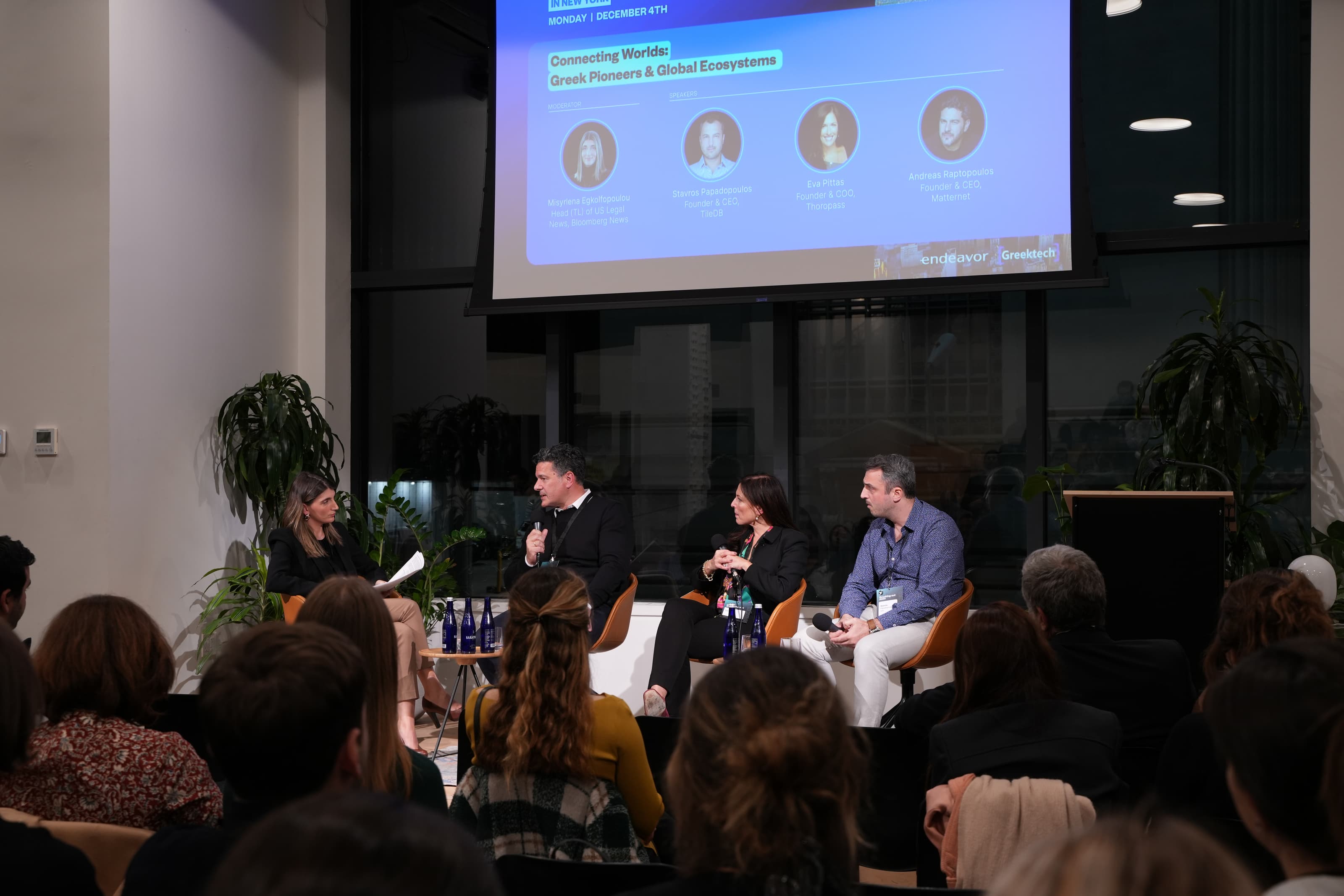Our second panel at our 7th Greeking Out event, featured Stavros Papadopoulos, Founder & CEO @ TileDB and Endeavor Entrepreneur, Eva Pittas, Founder & COO @ Thoropass, Andreas Raptopoulos, Founder & CEO @ Matternet and Endeavor Entrepreneur moderated by Misyrlena Egkolfopoulou, Head (TL) of US Legal News at Bloomberg News on connecting two worlds; Greek Innovators and Greek Ecosystems.

Let’s go back to the Basics
Education in Greece: Empowerment
In assessing the global competitiveness of Greek universities, Stavros expresses confidence in their ability to produce students capable of competing on an international scale. Greece has performed well in global research indices, showcasing a robust foundation for innovation, however, he identifies a crucial gap between industry leaders and research, highlighting the need for empowerment.
Proud of his Greek university education, Stavros contends that these institutions produce exceptional thinkers, laying a solid foundation for entrepreneurship, success, and life in general. He advocates for empowering young talents, bridging the gap between academia and industry, and creating a conducive legal framework to retain and foster innovation within Greece.
Looking ahead, Stavros envisions the development of a legal framework for artificial intelligence in Greece, anticipating its potential to position the country as a global hub for emerging technologies.

Eva chimes in by stating that JPMorgan's innovation hub in Greece is a testament to local talent, showcasing the need for universities to integrate technical skills with in-house entrepreneurship programs.
Compensation, Proximity & Entrepreneurship
In addressing challenges within his domain, Stavros identifies critical issues hindering Greek academia's competitiveness, particularly in comparison to institutions like MIT.
Compensation. There is a stark difference in professorial quality and compensation, stressing the need to attract top talent by properly remunerating professors.
Proximity. He points out that industry collaboration thrives when academic and industrial sectors are geographically close, as exemplified by MIT's success. Having people who want to solve complex problems, close to those who have done top-notch research is key.
Properly Teaching Entrepreneurship. As a distinct discipline, recognizing its unique nature insisting that proper training and dedicated programs are essential for cultivating a culture of entrepreneurship.
From Corporate to Startup: Passion & Resilience
Eva's journey from the corporate sector to founding her own company was marked by a bold leap into the unknown. Fueled by her industry insight and a desire for change, she embraced the risks inherent in entrepreneurship, transitioning from a steady paycheck to the challenges of raising capital. In the early stages, with no immediate income, Eva built a team, emphasizing the necessity of passion and unwavering belief in the venture's impact.

What set her apart was not just financial readiness but a determination to forge ahead despite uncertainties. Eva's story unfolded with the strategic assembly of a network that proved instrumental in navigating the entrepreneurial landscape and crossing of paths with like-minded founders. This is a testament to the transformative power of passion, resilience, and strategic networking in the pursuit of entrepreneurial success.
How to attract specialized funds
The Endeavor Model
As an Endeavor entrepreneur, deeply believing in the model, Andreas emphasizes the transformative impact of initiating startup activity in a new location. With the first win, information flows seamlessly, enabling aspiring entrepreneurs to access the knowledge needed to build successful companies. As more startups flourish, attracting talent and garnering success, larger funds take notice, creating a thriving ecosystem. This bottom-up approach, driven by Endeavor over the years, is seen as the catalyst for fostering a robust entrepreneurial landscape.
Mimicking something that works
Eva underscores the symbiotic relationship between success and investor-friendly policies in fostering a dynamic startup landscape. With a keen focus on favorable tax policies, including corporate benefits for founders and attractive long-term capital gains taxes, Eva emphasizes the crucial role these factors play in enticing investors. The goal is to create an environment where financial success aligns with investors' interests, ensuring a mutually beneficial ecosystem for sustained growth.

A positive look
Stavros expresses contentment with the evolving venture capital (VC) scenario in Greece, highlighting his collaboration with local and major VC players like Big Pi and Endeavor Catalyst - as they have invested in TileDB. The positive shift aims for more success stories, making them replicable. Notably, the landscape has transformed in the past five years, with a growing trend of co-investing with significant funds and facilitating introductions to Greek founders, marking a promising advancement in Greece's VC ecosystem.
Addressing challenges in the investor attitude towards Greece, Stavros suggests a need for a broader cultural shift. While acknowledging the difficulty of fundraising, the focus remains on finding the right investor. Rather than attempting to change existing investors’ mindsets, he advocates for expanding the startup pipeline. Recognizing a gap in training, the emphasis is on preparing Greek founders to compete globally. The strategy involves prioritizing the improvement of local startups and founders, ultimately aiming for heightened competitiveness in the global startup landscape.

Talent: Hiring Abroad and establishing Subsidiaries in Greece
The shift to remote work has significantly impacted talent acquisition strategies for Eva and Stavros. Eva's company, with a founding engineer based in Costa Rica and a substantial remote team, highlights the benefits of operating across time zones and embracing diverse perspectives. Managing a team of 60 engineers in Costa Rica not only enables operational flexibility but also provides a cost advantage, with salaries being about half of what they would be in the U.S. This remote model, contributing to the company's growth, emphasizes the newfound advantages in both diversity and cost-effectiveness.

Stavros touches on talent, and how the cost profile is different depending on where you operate and who you hire - and where they are based. Stavros emphasizes the critical need for superior technology to compete with industry giants, and while acknowledging talent in Greece, he faces difficulty finding individuals with the specific expertise required for make-or-break situations, a challenge even more pronounced than in the U.S.
Matternet: A Guinea Pig
Andreas paints a vivid picture of Greece's potential to become a trailblazer by sharing a page from Switzerland's playbook with Matternet. Matternet played the role of the adventurous guinea pig, by bravely experimenting, they not only defined a framework but also got adopted by the European organization EASA, making it the standard. Andreas attributes these moves to the visionary people involved, willing to take a risk and to the buy-in from the government. Now, with AI on the horizon, Greece can boldly step up. By swiftly embracing and experimenting, even with a sprinkle of risk, the country can magnetize startups, becoming a hub for innovation and a global talent magnet.
Building Strong Foundations
Network
Knowledge
Curiosity
These are the three integral skills a founder should have in their back pocket when embarking on an entrepreneurial journey. First up, the knack for building networks and soaking in mentorship magic—knowing the right folks and cozying up to problem-solving wisdom. It's all about making friends and finding sage advice. Next, embrace the study grind. Dive into books, pick the brains of both the altruistic and the wise, and stay curious. Most importantly, hunt down what sets your soul on fire. Passion is the compass but the journey needs perseverance.
